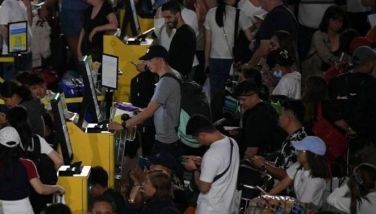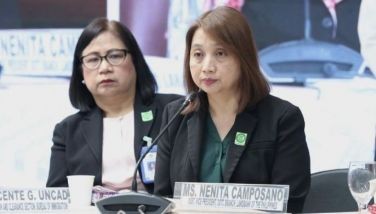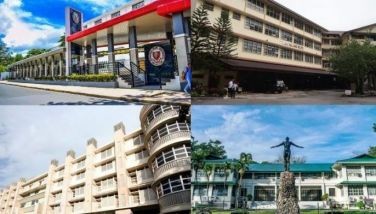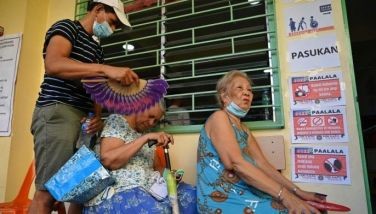Face-to-face classes? Not this school year
MANILA, Philippines — President Duterte does not want to open schools for face-to-face classes this academic year amid the COVID-19 pandemic, Sen. Bong Go said yesterday.
Go said the President considered the safety of learners who might be exposed to the virus as the government has yet to roll out the national vaccination program, a step to arrest the pandemic.
“On the issue of the face-to-face classes, I think the President said it will be for the next calendar year. You know classes are about to end in June so maybe classes will open in August, not this March or April,” Go said in an interview over radio dwIZ.
“It’s hard. You know we are busy with vaccination rollout now and there’s a proposal to open face-to-face classes, what if someone is positive? The government is busy with the planned rollout and, instead of focusing on the rollout, the attention will be divided into contact tracing again,” he added.
He urged those pushing for face-to-face classes to focus their attention on the vaccination plan and strictly observe health protocols, wearing a mask and face shield – which has been proven to be 90 percent effective in preventing the spread of infection.
“Wearing of face mask, face shield social distancing and hand washing are the basic protocols. We must follow,” Go noted.
Senators continue to insist on pilot testing of face-to-face classes or holding classes in schools even after President Duterte turned down the idea without the vaccination rollout.
At the virtual public hearing of the Senate committee on basic education last week, Sen. Imee Marcos said that the risk of COVID-19 to young people is not substantial, noting that less than 10 percent of COVID-19 cases are people around 20 years old, and minors afflicted with the virus account for only two percent.
“I feel very sorry for the lost year of our youth and I hope that the hearing will prove that the schools deserve to be opened as soon as possible. It should have been opened ahead of the cinemas, gaming arcades and cockpit arenas, as if we do not value the education of our children. I fully support the opening of the school as soon as possible,” Marcos said.
Like Marcos, Sen. Nancy Binay wondered why children are allowed to go for a walk in Boracay, go for a walk in the mall and play in the arcade but not go to school for their education.
Sen. Sherwin Gatchalian, chairman of the Senate committee on basic education, also pointed out that pilot testing of face-to-face classes can be conducted in areas where there are no COVID-19 cases or have low risk of infection.
He said there are 433 municipalities that have yet to record any COVID cases and which can hold limited face-to-face classes.
In the absence of face-to-face learning, the Department of Education (DepEd) has been implementing different education models: modular distance learning, online distance learning and TV-radio-based instruction.
Gatchalian said even with different models of learning, the most popular is distance learning or the use of modules, simply because access to the internet is difficult, “About 70 to 80 percent in public schools use the self-learning modules, which is quite applicable for independent learners, grade 4, grade 5 and above, and can learn by themselves.”
Education Undersecretary Nepomuceno Malaluan said the DepEd has considered the implementation of face-to-face classes but President Duterte decided against it.
“I believe everyone is aware of the decision of the President not to allow, at this point, any contact in person or face-to-face classes pending the rollout of the vaccine. I think it’s a similar position in the opening of the economy,” Malaluan told the committee.
“The necessity and advantages of face-to-face classes are known by the department and all department or ministries of education around the world.”
Gatchalian and Sen. Francis Pangilinan proposed to change the template of face-to-face classes to convince the President or the Inter-Agency Task Force for the Management of Emerging Infectious Diseases (IATF).
Gatchalian also noted that the DepEd appeared to be relying too much on IATF when the department should form its own panel of experts, saying education is a specific sector and IATF looks at it as a very broad situation. He said he has spoken to some mayors whose localities remain zero-COVID cases.
Catching up
Senate President Vicente Sotto III filed Senate Resolution No. 663 calling for the reopening and resumption of face-to-face classes, insisting “there is no substitute for face-to-face classes, which is probably the best way to arrest the decline in (education) quality and to improve learner outcomes” in the country.
“There are deep concerns that while countries whose students had performed well in the past international assessments are already back on track, the Philippines is still lagging behind using the blended learning method, which to many is not an effective means due to lack of access to internet and gadgets by majority of pupils and students,” Sotto said.
Sotto noted that the Philippines remains one of the 14 countries out of 150 countries worldwide and the only country in Southeast Asia that has kept its schools closed, while many countries had already reopened their schools and allowed physical classes to resume.
He said there is a need for the Philippines to play catch-up with the rest of the world since the country has fared poorly in assessments conducted prior to the pandemic by local and international bodies, such as the National Achievement Test (NAT), Programme for International Student Assessment (PISA), Trends in International Mathematics and Science Study (TIMMS) and Southeast Asia Primary Learning Metrics (SEA-PLM).
“As education is the key to any country’s success, there is really a need to start opening up because the Philippines is continually being left behind, being the only country in Southeast Asia with no face-to-face classes,” he said.
- Latest
- Trending
































